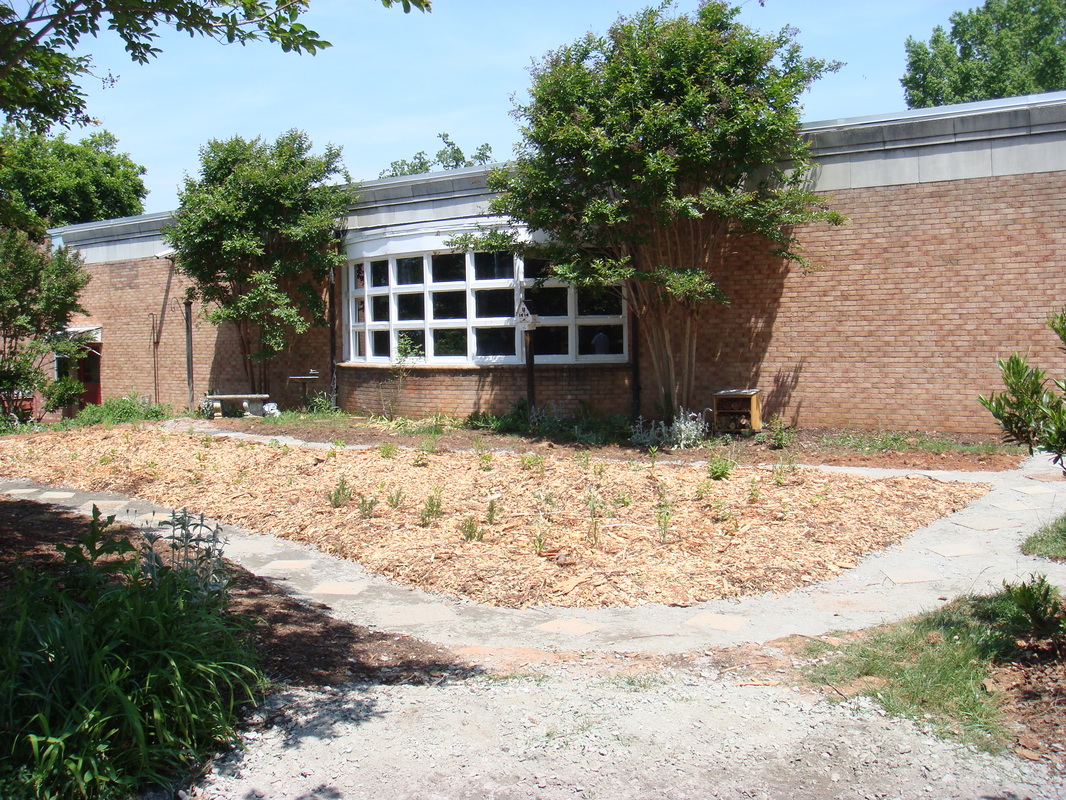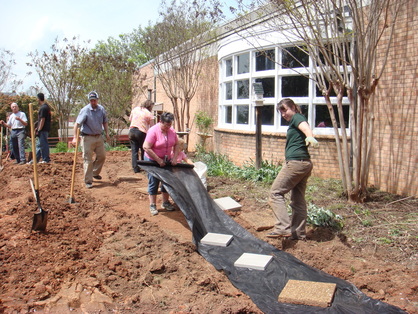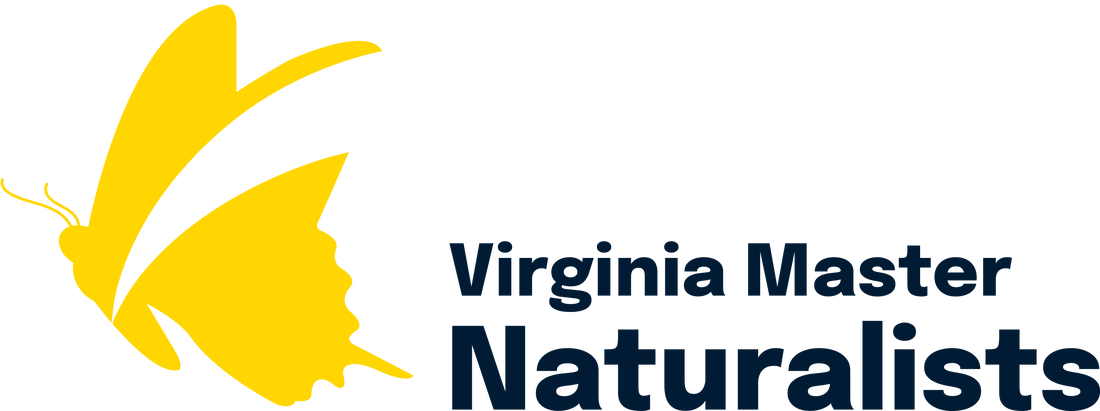 New "Secret Garden" installed by Virginia Master Naturalists at the Martinsville Branch of the Blue Ridge Regional Library. Photo by Kathy Fell
New "Secret Garden" installed by Virginia Master Naturalists at the Martinsville Branch of the Blue Ridge Regional Library. Photo by Kathy Fell Article by Kathy Fell, VMN-Southwestern Piedmont Chapter
If you look behind the Martinsville Branch of the Blue Ridge Regional Library, you will find a new habitat demonstration garden where there used to be a lawn. Martinsville Branch Manager, Jim Woods, is looking forward to using the garden as a teaching tool to “make our patrons and guests aware of the wonder just outside the big bay window in the Family Fun Zone …and encourage inquiry about the plants and animals seen living in our backyard.” This new “Secret Garden” is a collaboration between the local Library, the Southwestern Piedmont Chapter of the Virginia Master Naturalist Program and the Habitat Partners© Program of the Virginia Department of Game and Inland Fisheries (VDGIF).
The garden includes about two dozen species of colorful native plants such as milkweeds, bee balm, and asters. Species were selected to provide continuous bloom from spring to fall and include all colors of the rainbow. These types of plants attract and provide food for important pollinators such as butterflies, moths and bees. The insects, in turn, will attract many birds that rely on this source of protein to feed their young.
The idea for the garden dates back to September 2012 at the Virginia Master Naturalist state conference. The Library grounds were used as a possible habitat improvement site for a class taught by Carol Heiser, Education Manager and Habitat Education Coordinator at VDGIF. A Chapter member, Jim Tobin, attended that class. This year, he approached the library with a few others from the Chapter to see if we might implement some of the ideas.
VDGIF provided training and technical assistance to the Master Naturalists in the early stages of the project. The garden, designed by Chapter member Kathy Fell, replaces all the grass with a pollinator garden and discovery trail. Storm water run-off and erosion were issues on the site. The central and lower areas of the garden are graded to mimic the function of a rain garden. A true rain garden is sized according to the volume of rain calculated to run off a site during a storm event and is constructed using a special soil mix that helps to quickly absorb the rainwater within a few days. The space at the library was not large enough to accommodate a fully engineered rain garden. Instead, the design includes smaller water retention areas at both the top and the lower part of the garden, to be planted with wet-loving native plant species.
 Volunteers install the garden and habitat elements. Photo by Kathy Fell.
Volunteers install the garden and habitat elements. Photo by Kathy Fell. Once the design was completed, construction began. A group of volunteers pruned overgrown shrubs. The City of Martinsville provided a back hoe to dig the lower storm water retention area, fill it with gravel and top it off with soil. The upper garden was graded and the turf removed. Volunteers finished grading by hand, dug the discovery trail and worked in a truck load of compost to improve the soil.
The Habitat Partners© Program purchased over 130 native plants for the space. “Public projects like these are a great way for people to see how easy it is to garden in harmony with nature,” says Carol Heiser. “Anytime we replace lawn with a diversity of native plants and use those plants to intercept runoff, we not only improve water quality, but we also help bring the life back to our landscapes. Birds, butterflies, frogs and many other wildlife species all benefit whenever you use these conservation practices.”
After planting, the area was mulched and the discovery trail was constructed using crusher run donated by Boxley, landscape fabric donated by Lester Home Center, and pavers donated by Chapter vice president Jessica Driver. Southern States donated some mulch and chapter member Andy Lash donated gravel for the lower retention area and made multiple trips to fetch gravel, compost and mulch. Food Lion donated lunch to keep the volunteers going on one of the longer days. It took ten work days over 3 months to complete the garden and path.
A pair of nesting blue birds watched the progress from an old bird house outside the library window. To finish off the project, the Master Naturalist Chapter will install a new birdhouse in February and include the Library Secret Garden in one of our blue bird monitoring trails. We have also donated a bug hotel to attract beneficial insects to the garden.
The library garden is now certified by the Habitat Partners© Program because it provides food, water and cover for a diversity of wildlife species. Learn more about native plants and how you can improve habitat on your property from the Virginia Department of Game and Inland Fisheries.
The Habitat Partners© Program purchased over 130 native plants for the space. “Public projects like these are a great way for people to see how easy it is to garden in harmony with nature,” says Carol Heiser. “Anytime we replace lawn with a diversity of native plants and use those plants to intercept runoff, we not only improve water quality, but we also help bring the life back to our landscapes. Birds, butterflies, frogs and many other wildlife species all benefit whenever you use these conservation practices.”
After planting, the area was mulched and the discovery trail was constructed using crusher run donated by Boxley, landscape fabric donated by Lester Home Center, and pavers donated by Chapter vice president Jessica Driver. Southern States donated some mulch and chapter member Andy Lash donated gravel for the lower retention area and made multiple trips to fetch gravel, compost and mulch. Food Lion donated lunch to keep the volunteers going on one of the longer days. It took ten work days over 3 months to complete the garden and path.
A pair of nesting blue birds watched the progress from an old bird house outside the library window. To finish off the project, the Master Naturalist Chapter will install a new birdhouse in February and include the Library Secret Garden in one of our blue bird monitoring trails. We have also donated a bug hotel to attract beneficial insects to the garden.
The library garden is now certified by the Habitat Partners© Program because it provides food, water and cover for a diversity of wildlife species. Learn more about native plants and how you can improve habitat on your property from the Virginia Department of Game and Inland Fisheries.


 RSS Feed
RSS Feed